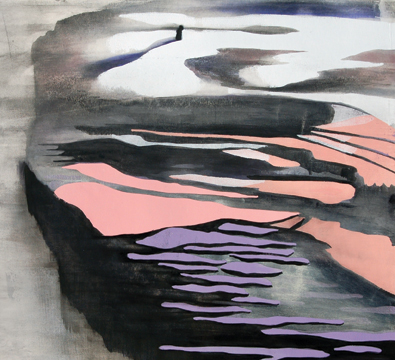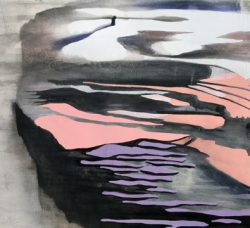Hailing from New Jersey and boasting an impressive list of influences (including Beardfish and Echolyn), art/progressive rock quintet The Tea Club has been earning a plethora of acclaim since forming roughly a decade ago. Currently comprised of Patrick McGowan (vocals, guitar), Dan McGowan (vocals, guitar), Jamie Wolff (bass, violin, cello), Joe Dorsey (keyboards), and Dan Monda (drums), each of the outfit’s previous three efforts—General Winter’s Secret Museum (2008), Rabbit (2010), and Quickly Quickly Quickly (2012)—received strong reception within the community, resulting in tours alongside notable acts like Thank You Scientist, Consider the Source, and Trioscapes. It comes as no surprise, then, that The Tea Club maintains its excellence on Grappling, another brief but bountiful excursion into composited, eccentric, and appealing progressive rock.
The band describes the LP as a blend of “complex, angular instrumentation, anxious and powerful lyrics, virtuosic performances, and endearing melodies.” As with most music in the field, the record also serves as conceptual statement; in this case, it “summons a series of characters grappling with various personal struggles, told through vivid stories shrouded in utter fantasy.” Truth be told, Grappling is as daring and interesting as the majority of works being made by today’s biggest genre acts, so it demonstrates how much The Tea Club deserves to be an [inter]national household name.
The collection begins with “The Magnet,” a colorful frenzy of acoustic guitar arpeggios, fiery electric guitar riffs, shifty percussion, carnival-esque synths, and impassioned vocals, evoking traces of Swedish darlings like The Flower Kings and KAIPA. Dynamically, there’s plenty of juxtaposition between concentrated madness and delicate breadths, and the lyrics are appropriately philosophical yet cryptic and bizarre. In contrast, “Remember Where You Were” is more sinister at first, with ominous whispers clashing over dark tones and stilted rhythms. Once the electric piano comes in, though, things become more peaceful and hopeful, with some tonal shifts reminiscent of some ‘70s pioneers. It’s a more straightforward track than its predecessor too, making it a bit more accessible.
“Dr. Abraham” bursts with even more of a sinister edge, like the progressive rock offspring of Black Sabbath. Also, its melodies are delivered conversationally and sharply, enhancing the gothic theatricality. It’s a chaotic beast overall, with a somber and atmospheric middle section that effectively connotes false security. It’s followed by “The Fox in a Hole,” a warmer and more playful voyage filled with acoustic guitars, violins, and falsetto harmonies. There’s a definite Gentle Giant vibe here as well, as interlocking instrumental patterns create a dizzying yet fascinating and curious concoction.
Among the most melodically joyous moments on Grappling is “Wasp in a Wig.” Lead by rich piano motifs and equally textured singing, its calmer moments are quite angelic, while its heavier bits succeed due to colorful keyboard flourishes and forceful syncopation. Of course, the McGowans also throw in some coarse guitar licks, making its contrast between serenity and anarchy even stronger. Finally, the sequence concludes with its lengthiest track, “The White Book,” whose opening ether and main keyboard tones seem plucked straight from Genesis’ Wind and Wuthering. This isn’t to say that the track is unoriginal, though, as The Tea Club still packs in plenty of unique momentum and attitude. This track also houses the album’s strongest temperamental changes, with the urgent but reserved verses giving away to explosive, multilayered choruses. Halfway through, a new section emerges, decorated by panicked harmonies, and the closing jam is highlighted by some charming acoustic guitar virtuosity.
Grappling doesn’t reinvent the wheel, but its ambition, production, and quality of songwriting and instrumentation are remarkable nonetheless. Because of this, it’s even more surprising (and tragic) that The Tea Club remains mostly localized, as a relatively small amount of genre fans outside of the Philadelphia/New Jersey area likely know of it. As with the quintet’s previous work, Grappling is a fantastic effort that deserves as much attention as it can get. Sure, the band’s influences are obvious, but the same could be said for most of progressive rock’s biggest modern acts, and when all is said and done, The Tea Club still covers its music with enough trademark flair to make it worthwhile. If you’re a fan of this style, you should tackle this record ASAP.


